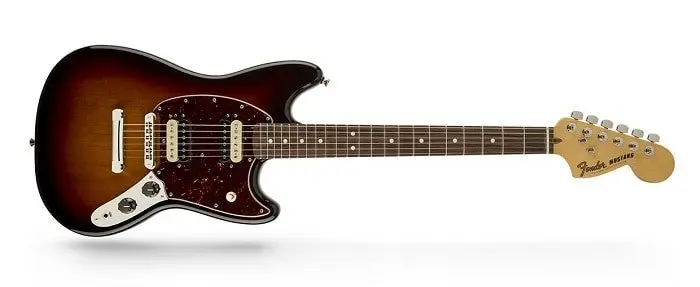 If you have been playing electric guitars for some time, you have probably heard your peers mention a 24 inch scale guitar occasionally.
If you have been playing electric guitars for some time, you have probably heard your peers mention a 24 inch scale guitar occasionally.
To those who haven’t been involved in the world of guitars for a long time, this concept may sound odd and simply illogical.
Why would anyone want a guitar that isn’t standard? And on that matter, why would anyone pick a guitar that constricts the number of notes you can play? These are all perfectly reasonable questions that have perfectly logical answers to them.
In this article we will talk about guitars that have a 24 inch scale. These are not all that uncommon, and for the most part the only people who are buying them are those who know exactly why they want a shorter scale on a guitar. By the time we finish this piece, you should have a decent understanding of what 24 inch scale guitars have to offer, and how they might fit your needs.
What this guitar can offer ?
Those that have a limited knowledge about how guitars work will probably say that the whole point of 24 inch scale guitar is to have a more compact instrument that is somewhat better suited for those what have a smaller stature.
While that is true to a certain extent, there are other more important reasons why people choose these guitars. In order to fully understand all of this, we need to talk about how the length of the scale affects the sound of the guitar.
A good majority of people don’t realize that if you take two identical guitars, one with a standard scale and one with a 24 inch scale, that they won’t sound the same. You can exact same components on each, same bridge, same pickups, same tuning pegs, everything. They will simply sound different compared to each other. The explanation for this lies in the length of the strings.
When you shorten the scale on a guitar, you are effectively reducing the distance between the nut and the bridge. This very distance dictates how closely packed your harmonics will be, and the frequency of the strings. When you chop off a part of the scale, you are essentially altering the voice of your guitar in the most fundamental way possible.
Guitars with a standard scale have a much more defined tone, especially when you play lower notes. A short scale guitar will add some color to the tone, and give it more warmth. A great example of this difference in tone is to compare a Gibson SG and a Fender Stratocaster.
Gibson features a scale that is close to a full inch shorter than the one on a Strat. This difference in scale length gives these guitars their trademark voice. You can interchange the components between the two, and they will still sound differently.
 So why do some people choose to get a guitar with a shorter scale? Well, aside from different tonal properties, guitars with a shorter scale are usually more comfortable to play. The strings will be a bit more loose, which gives you more fidelity. The other large reason is that not everybody has long fingers and large hands. Some will find a short scale guitar to be a much better fit for them. The neck on these guitars is also slimmer and somewhat thinner as well. No matter how big your hands are, you will probably find these necks to be faster.
So why do some people choose to get a guitar with a shorter scale? Well, aside from different tonal properties, guitars with a shorter scale are usually more comfortable to play. The strings will be a bit more loose, which gives you more fidelity. The other large reason is that not everybody has long fingers and large hands. Some will find a short scale guitar to be a much better fit for them. The neck on these guitars is also slimmer and somewhat thinner as well. No matter how big your hands are, you will probably find these necks to be faster.
So the truth about 24 inch scale guitars is that they are a whole different animal. It’s not only about the seize of the guitar itself, it’s about the tone and voice of the guitar as well. If you are not sure which one will suit you better, it’s a general recommendation to go out and try both of these scale lengths and figure out what works for you, and what doesn’t. Chances are that this factor, which is largely unknown to people, can impact your decision greatly. So keep that in mind when shopping for guitars.
All things considered
A 24 inch scale guitar can be the solution you were looking for. If you find a Strat type guitar to be too large for you, a short scale Gibson will probably suit you better. For those who are not restricted by the size of their hands, the difference between the two guitars scale lengths will probably be too subtle until you compare them side by side.
Ergonomics aside, some guitar players simply know what kind of tone they want to achieve. It’s no secret that 25 inch scales work better than 24 inch scales for certain applications, and vice versa. With that said, it is important to understand that every guitar is essentially a tool which will do one thing great, while it will lack performance in some other aspects.
